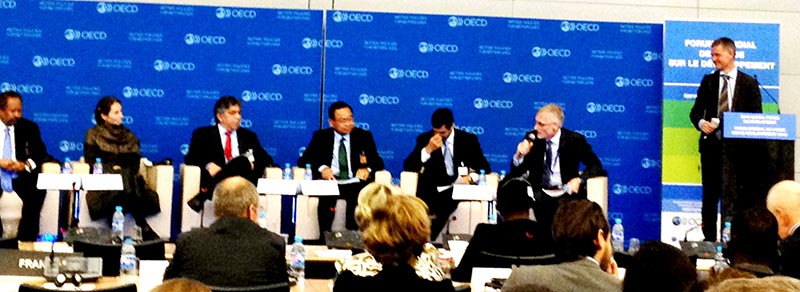JICA-RI Researcher Takes Part in Discussion at OECD Global Forum on Development
2013.04.15
From April 4 and 5, the 2013 Global Forum on Development (GFD) was convened at the headquarters of the Organisation for Economic Co-operation and Development (OECD), in Paris, France. The event, focusing on a post-2015 world, is the first of a series of three forums to be held over the next three years. The Forum aimed to explore and exchange opinions on innovative approaches to poverty reduction, social cohesion, wellbeing and progress in the post-2015 world.
Distinguished participants gathered at the Forum, including: former president of the Federal Republic of Nigeria Olusegun Obasanjo; former South Korean Minister of Foreign Affairs and Trade Kim Sung-Hwan; President of the Global Development Network (GDN) Pierre Jacquet; World Bank Vice President Otaviano Canuto; Director of the Oxford Poverty and Human Development Initiative Sabina Alkire; and OECD Secretary-General Angel Gurría. From JICA-RI, Research Fellow Yoshiaki Takahashi attended the event.
At the Forum, while the current millennium development goals (MDGs) were valued as an effective approach to apply development policies for poverty reduction on a global scale, some attendants stressed the importance of human-centered approach; Director of OECD Development Centre Mario Pezzini commented that we should focus more on domestic inequality; GDN President Pierre Jacquet also stated that in order to turn ideas to action, it is important to think of who we (the people who should actually take action) are. In addition to the above comments, other participants pointed out the importance of sustainability.
The voices on Sustainable Development Goal (SDG) were also heard: While discussion of post-2015 and that of SDG from Rio+20 outcome document have been underway separately, European Union is turning their political attentions towards sustainability; If the discussion of SDG proceeds separately without being integrated into that of post-2015, the interest in poverty reduction approaches might wane off.
Dr. Canuto, on the subject of insufficient data to evaluate MDGs, pointed out the lack of data on poverty, along with Dr. Alkire’s remarks on the need to obtain data for promoting poverty reduction. Therefore, she stressed the importance that the post-2015 agenda should include standardized surveys carried out in all countries.
In light of the comments, Statistics Consultant Espen Beer Prydz suggested that efforts could be made to employ information technology for such as conducting surveys with utilizing mobile phones, which have high penetration rates in developing countries. Furthermore, Ms. Gay Tejada of the Philippine National Statistical Coordination Board stated that, with strong demand for data in a post-2015 framework, the efficiency and sustainability of statistical systems should be considered in order to advance the quality of statistics. In the same discussion period, the OECD Chief Statistician Martine Durand also pointed out that capacity building in statistics among developing countries should be stressed in the post-2015 agenda.
Takahashi, introducing his interview survey on happiness conducted in Thailand and India as an effort of listening to people’s voices, noted that upskilling of enumerators who conduct surveys in field is essential for enhancing statistics capability. He also stressed the significance of creating networks to gather information that administrative agencies hold. Reflecting the lack of data on health despite the fact that health is the major goal for MDGs, he made a few specific suggestions: collecting statistics of hospital visits, hospitalizations, and mortality by networking hospitals; and simultaneously creating a network, maintaining hospital facilities, and improving data quality through official development assistance (ODA).
At the end of the Forum, to explore an impact of inclusive growth on reducing poverty and social disparities is proposed as a main agenda for the next year’s forum.


事業事前評価表(地球規模課題対応国際科学技術協力(SATREPS)).国際協力機構 地球環境部 . 防災第一チーム. 1.案件名.国 名: フィリピン共和国.

事業事前評価表(地球規模課題対応国際科学技術協力(SATREPS)).国際協力機構 地球環境部 . 防災第一チーム. 1.案件名.国 名: フィリピン共和国.

事業事前評価表(地球規模課題対応国際科学技術協力(SATREPS)).国際協力機構 地球環境部 . 防災第一チーム. 1.案件名.国 名: フィリピン共和国.

事業事前評価表(地球規模課題対応国際科学技術協力(SATREPS)).国際協力機構 地球環境部 . 防災第一チーム. 1.案件名.国 名: フィリピン共和国.

事業事前評価表(地球規模課題対応国際科学技術協力(SATREPS)).国際協力機構 地球環境部 . 防災第一チーム. 1.案件名.国 名: フィリピン共和国.
scroll